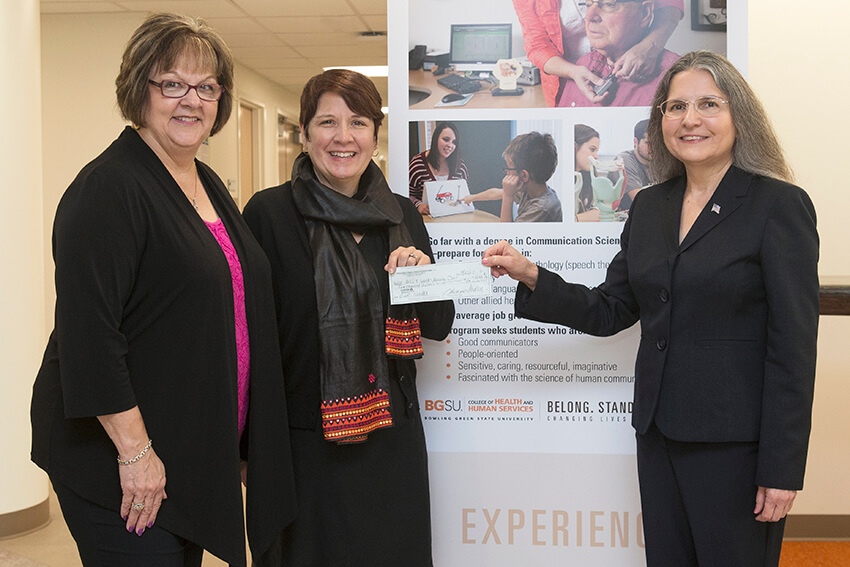Speech and Hearing Clinic to serve Wood County veterans
Grant allows speech/language and cognitive services for veterans with traumatic brain injuries, PTSD

By Amber Stark '99
Bowling Green State’s University’s Speech and Hearing Clinic is starting a new initiative to support Wood County veterans, thanks to a grant from the Resurrecting Lives Foundation. The $10,000 grant will allow the clinic to provide services to veterans experiencing traumatic brain injuries and post-traumatic stress disorder.
Clinic staff learned about the grant from Mary Hanna, executive director of the Wood County Veterans Assistance Center, in September. Clinic staff put a grant proposal together, Hanna took it to Dr. Chrisanne Gordon from Resurrecting Lives, and the grant was awarded.
“It happened very quickly,” Clinic Director Donna Colcord said. “We are thrilled to be able to partner with them.”
The Wood County Veterans Assistance Center provides a variety of services to Wood County veterans and their families. The Resurrecting Lives Foundation coordinates and advocates for the successful transition to a post-military career and life for veterans with traumatic brain injury.
The grant will be used to provide services to veterans with mild-to-moderate TBI and PTSD. There are nearly 13,000 veterans living in Wood County and more than 150 at BGSU. While the clinic has worked with individuals with cognitive disorders, this will be the first project designed for veterans.
“What we find is that these two diagnoses often go hand in hand,” Colcord said, adding that this level of disability often does not get discovered in health assessments.
“Deficits in areas such as memory, comprehension, problem-solving are not typically identified in day-to-day routines,” she said. “It’s when we challenge individuals, in work or class, that they appear.”
Because moderate-to-severe issues are more diagnosable, veterans often receive services for these injuries. Focusing on veterans with mild-to-moderate TBI and PTSD allows the clinic to support an underserved population.
Individuals with mild-to-moderate TBI and PTSD may experience difficulties focusing in the classroom, paying attention, initiating or completing a task, remembering information and problem solving.
“It can impact their ability to be successful,” Colcord said. “We want to help them realize that, yes, these are real problems and there’s help for them.”
“Deficits in areas such as memory, comprehension, problem-solving are not typically identified in day-to-day routines,” she said. “It’s when we challenge individuals, in work or class, that they appear.”
An information letter has been sent to Wood County veterans notifying them of this new service, which includes a speech-language-cognitive functioning assessment and 15 free one-hour sessions. Hanna will refer veterans to the clinic for the assessment, which will identify areas where the individuals are having difficulties. Hearing evaluations will also be available. An individualized treatment plan will outline intervention services that address and manage those issues in order for the veteran to be successful.
“We would provide them with training for whatever skills or strategies that they need to be successful,” Colcord said. “The exciting piece for us, besides being able to provide these services to deserving individuals, is that because we’re a training facility, our graduate students will get unique, hands-on experience.”
The clinic sees a lot of preschool and school-age children, but not a large population of adults, so these services will allow the clinic to provide another population for student training. Graduate students at the clinic are enrolled in either the master’s or doctoral programs in Communication Sciences and Disorders.
Colcord hopes to serve 20 veterans in the first year of the project.
Updated: 12/02/2017 12:27AM
